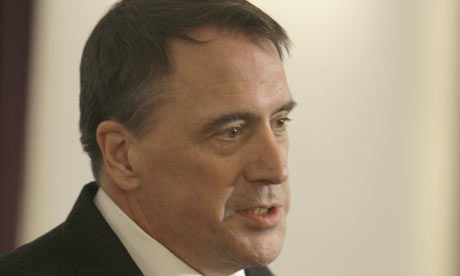
Peter Galbraith accused his former chief at the UN, Kai Eide, of deliberately playing down the level of cheating in the election. Photograph: Toby Talbot/Associated Press
A former senior United Nations diplomat in Kabul has made a scathing attack on the UN's handling of Afghanistan's disputed elections, claiming that almost one in three of the votes cast for president Hamid Karzaiwere fraudulent.
Peter Galbraith, the former deputy head of the UN mission in Afghanistan, singled out his former chief, Kai Eide, for criticism, saying he had deliberately played down the level of cheating in an election where, in one region, "10 times as many votes were recorded as voters actually cast".
Galbraith was sacked last week, after his disagreements with Eide, a Norwegian diplomat in charge of the UN mission, about how to deal with electoral fraud became public. Galbraith said the extraordinary level of fraud in the August vote "has handed the Taliban its greatest strategic victory in eight years of fighting the United States and its Afghan partners".
The election was a "foreseeable train wreck", he said, with Eide standing idle as Afghan election authorities and ministers loyal to the president avoided taking steps that could have reduced massive fraud.
The forceful intervention via an opinion piece in Sunday's Washington Post, came at an increasingly difficult time for the US-led war effort, beset by deteriorating security, mounting deaths and political uncertainty. The US military suffered its deadliest day in more than a year on Saturday when eight American soldiers were killed in sustained attacks on eastern outposts.
Galbraith's disclosure could torpedo what many diplomats in Kabul suspect is an attempt by Eide and the US to minimise controversy over fraud allegations, and to move quickly to declare Karzai re-elected president. Opposition politicians, including Abdullah Abdullah, the second-placed candidate, who wants to see a run-off vote, have seized on remarks made by Galbraith since he was sacked by Ban Ki-moon, the UN secretary general, last Wednesday.
On Saturday Abdullah accused Eide of "giving a green card for fraud to determine the outcome of the election".
A war of words between Galbraith and the UN (which has attempted to characterise the row as a "personality dispute") has been gradually escalating. In a letter to Ban, leaked to the New York Times, Galbraith made devastating allegations against Eide, including the claim that the latter ordered him not to hand to election officials information which showed turnout had been tiny in the south, where the Taliban intimidation campaign against voters was most effective.
Galbraith also said Eide told him to stop lobbying for the elimination of "ghost polling stations" — voting centres too dangerous to actually open, but which nonetheless received ballot papers that could be filled out by corrupt officials.
His article in the Washington Post, "What I Saw at the Afghan Election", went even further with its claim that a third of Karzai's votes were fraudulent. If true, that would mean the president received well under the 50% for him to win on the first round. Preliminary results give Karzai 55% and Abdullah 28%.
The UN-backed Afghan election complaints commission has ordered an audit of 10% of 3,063 votes deemed to be suspicious either because of a very high turnout or where nearly all votes went to a single candidate.
However, Galbraith writes: "President Obama needs a legitimate Afghan partner to make any new strategy for the country work. However, the extensive fraud that took place on August 20 virtually guarantees that a government emerging from the tainted vote will not be credible with many Afghans."
Unless the US can build a relationship with a legitimate Afghan partner, its options are drastically reduced. The White House press secretary, Robert Gibbs, last week recognised as much: "Without a willing partner, one free of corruption and transparent, I don't think any situation or any series of meetings can adequately solve for the Afghan people the problem that that would contribute to."
In his earlier letter to Ban, Galbraith also claimed Eide prevented him trying to stop the independent election commission, in overall charge of the vote, from abandoning its safeguards, which would have excluded fraudulent ballots, probably reducing Karzai's score to below 50%, forcing a second-round vote.
Eide told him to back off, Galbraith said, after Karzai ordered his foreign minister to protest that the American was interfering in Afghan affairs. He said the Afghan government threatened him with expulsion.






















No comments:
Post a Comment